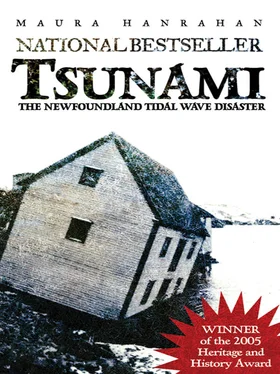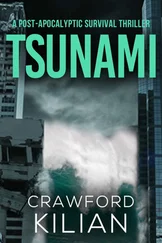“No, Mommy,” Dorothy said. The little girl had stood up when the rumbling started but now she sat down at her sewing machine again. The red drained out of her face and she began to wait patiently, reassured by her mother’s words. As the two of them sat there, the dishes, cups and the kettle on the stove continued their odd little jig. The lamp flickered crazily but did not go out.
About five minutes later, the earth became still again. Dorothy and Frances said nothing but let out great gulps of air. It was awhile before they brought their hands back to the cloth and sewing machines.
Frances’ older daughter, Marion, was at another house in the village, writing a letter for an old lady who could not write but wanted to send a message to her sister in Boston. Marion wanted to go home when she felt the shock but she stayed put; she would finish the letter and then go—her parents had imbued a strong sense of duty in their children. After Marion signed the old lady’s name to the white sheet and folded it, she threw her coat over her shoulders and ran to the Kellys’ as if the wind were pushing her.
At the family supper that followed, all the talk was about “the big rumbling,” as young Curtis called it. Dorothy could almost laugh about it now that they were altogether—well, most of them; their father, Vincent, had sailed across to the peninsula, his objective to get a full load of wood for the winter. He would be gone for at least a week, probably closer to two weeks. Between his bites of cabbage and fish cakes, Curtis kept making funny noises, imitating the earth and the sounds it had made. It was an earthquake, a neighbour had told him, an earthquake in some far off place. Although they had felt it here in Newfoundland, it was nothing for them to worry about; these things reverberated from quite a distance.
Although she could laugh about it with her brothers and sister, Dorothy still had a bad feeling deep in her belly. Marion felt as if ladybugs were crawling up her chest as she did her English homework at the kitchen table and wrote out the assigned sentence: “If you do not leave the house, I will send for the policeman with that fine.”
After the children finished their homework, Dorothy washed her long blond hair in the wash basin and, while it was still damp, Marion and Frances tied it in a chaotic pattern of red rags. When it dried, they would free it from the rags and it would be full of “glorious curls,” as the magazines promised.
As they finished tying Dorothy’s hair, Curtis went out to play. Curtis, who had the energy of a workhorse, begged his mother for another hour or so out of doors before bedtime. The youngest Kelly child, three-year-old Elroy, begged to go with him.
“All right,” Frances said to Curtis, finally giving in. “Stay in the meadow on top of the hill near your aunt’s house and don’t wander into the woods. The fairies are on the lookout for children after dark. But, Elroy, you stay here with us. You’re too young yet.”
“Take some bread for your pockets, Curtis,” said Marion. She was already tearing tiny cubes off the remains of the day’s loaf.
“That’s right,” Frances echoed. “That’ll keep you safe from the fairies.”
Curtis rolled his eyes. He wanted to be a soldier when he grew up and he wasn’t afraid of fairies. “I’m going to play armies,” he said. “The fairies will be frightened of me, not the other way around.”
“You take it and listen to your sister anyway,” his mother said, pushing a red wool cap over his head. “Go on now.”
Frances and Dorothy returned to their sewing machines. Curtis barely had time to reach the top of the hill when they heard the roaring of a wave. Marion ran into the yard to see a mountain of a wave slowly approaching them. She scooped Elroy up in her arms and hopped over the fence that separated the Kellys’ fence from their neighbours’. When she looked back, her family’s house was off its foundation and was just going out to sea.
Gelid salt water had flooded it. The wave lifted Dorothy from her chair and Frances from hers, swallowing them whole. For a minute Dorothy could see her mother’s blue dress and white apron. She stretched her hands as far as they could go and kicked her legs in a bid to reach Frances, but then her mother disappeared. Bubbles came out of her mouth, big ones and then small ones. She felt dizzy and she couldn’t breath. She had to get to her mother. She’d be safe then. But she couldn’t see Frances anymore.
Dorothy kept moving through the water and her head hit something solid. It was the ceiling of the first floor of their house. Oddly, it didn’t hurt and she could breath now; she’d reached an air pocket. She gulped huge mouthfuls of air and tried to tread water, like they did in the ponds in summer. For the first time she realized the water was cold and it hit her—this was sea water, not freshwater. The ocean had rushed into their house . She shook her head as if doing so would wake her out of a horrible dream. Where was her mother?
She plunged under the water again, looking for the blue and white of her mother’s clothing, but everything was grey and dark. And it was moving. The house was moving. The waves had taken the house off its foundation and, Dorothy suddenly realized, hauled it out to sea. She thought of her neighbours on shore; surely they could see this and were putting their boats out to rescue her and her mother. She knew that her father and Vincent Brushett were away, but Billy Foote, Ben Hollett, and a few other men were home. It did not occur to her yet that their houses might be swept away, also.
She pulled her head above the water. The red rags in her hair had come unfurled and had dropped into water like long ribbons of blood. Dorothy began shivering. I must not panic, she thought. She tried to move along the ceiling, trying to find the staircase so she could get to the second storey. It’ll be dry upstairs, she reasoned. Maybe Mommy is already up there.
It was hard to move along. The water dragged her down like it was quicksand. Her legs felt like they were made of stone. The lamp had long gone out and the blackness of the night was total now. She didn’t know which way to turn. She bit her lip and tried not to cry. Her mother and father would not want her to panic, she reminded herself. They’d want to be proud of her when this is all over. She crept along in the darkness, fighting off a feeling of sleepiness.
“Mommy!” she called out, figuring the shouting might keep her awake and help her rescuers find her.
“Mommy! Where are you? I’m here!”
There was no answer. There was no noise, save the slosh of the waves inside the little house and Dorothy’s cries. It seemed now that the house was moving faster, though she didn’t know in what direction. Maybe it will be put back in Kelly’s Cove, she thought, and all this will be over. But it was as if something was carrying the house a long, long way.
Then the frigid water rose up to the ceiling and Dorothy was covered in it again. Her arms and legs flailed about desperately as she fought off panic. With her hands she hit chairs and table legs and the walls of the family kitchen. Maybe the other houses in Kelly’s Cove are gone, too, she thought.
Then she was in the open ocean, just drifting like seaweed. She wasn’t cold anymore and, as it enveloped her, the sea began to give a comfort that felt familiar but that she could not recall exactly. The heaviness she had felt in the house had given way and her body was as light as a feather. She lazily opened her eyes and watched lobsters crawl, fish fly by, an eel scoot. It was all so beautiful.
As Dorothy sailed through the waters of the bay, she saw a light that had the brilliance of the finest cut diamond. She floated toward it, overwhelmed by its intensity. All around the light were thick glowing arms that reached for her. They called her name and pulled her to them. Without hesitation, Dorothy fell into their embrace and bathed in their warmth. At once, she felt a love even greater than the great love she had known in her short life as Frances’ beloved daughter in Kelly’s Cove, Newfoundland.
Читать дальше












